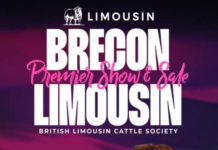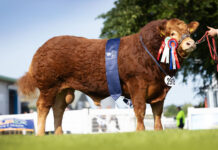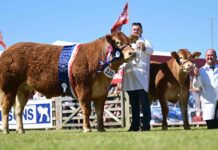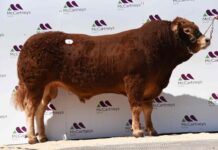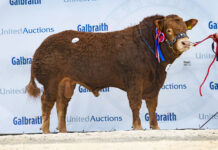HERD HEALTH AT BRITISH LIMOUSIN CATTLE SOCIETY (BLCS) COLLECTIVE SALES
FAQ – in brief
TB Testing for movement into Scotland – https://tbhub.co.uk/preventing-tb-breakdowns/trading-cattle/pre-movement-testing-in-great-britain/
- Cattle moving to Scotland from a high incidence (TB1) area of England and Wales and those coming from a low incidence area but have lived in a high incidence area at any time of their life (shows/previous sales etc) will require a clear pre-movement test within 30 days prior to movement.
- Date 0 of the movement window is counted as the date of injection of the skin test.
BVD at Premier Collective Sales (Carlisle and Stirling)
- All cattle need to be from an accredited free herd, or submit results of an individual virus free test
- Vendors can choose to vaccinate if they wish, but it is no longer mandatory.
Introduction
Following the cash-back Herd Health Initiative introduced by the Society in 2005, a second major health step saw the introduction of Herd Health Declarations at BLCS Collective Sales from 2007.
New herd health rules were introduced by the BLCS at nominated premier Collective Society Sales from May 2011 and these are now in place at all premier BLCS Collective Sales (Stirling February & October; Carlisle February, May, October & December; Brecon May & November).
The principal aim is to standardise herd health declarations and information presented in order to provide both members and customers alike with clear, accurate herd health information at the point of sale and within the given sale catalogue. As such it is attractive and informative for customers and aims to further raise the level of buyer confidence.
BLCS Herd Health Rules have two principal elements:
Part 1. From 1st May 2011, herds selling at the premier Collective Society Sales have to be members of, and adhering to, the terms of a CHeCS approved Herd Health Scheme. At a minimum, this must include a whole herd test for Johne’s disease.
Part 2. From 1st May 2011, all animals male and female, including calves at foot, presented at the premier Collective Society Sales be EITHER from a BVD Accredited Herd within a CHeCS approved Herd Health Scheme OR to have been BVD tested virus free. Pregnant animals must have had testing completed prior to service. Vaccination of calves at foot to be in accordance with CHeCS guidelines and recommendations.
Herd Health Declaration
The sale entry form is accompanied by a Herd Health Declaration form asking vendors questions regarding for example: TB status; membership of CHeCS (www.checs.co.uk) health schemes (AFBI Cattle Health Scheme, AXIOM Cattle Health Scheme, The Cattle Information Service, FarmLab HealthSure, HiHealth Herdcare, NML Herdwise, NML BVD Herdcheck, Premium Cattle Health Scheme, Shetland Animal Health Scheme) and Johne’s, BVD, IBR and Lepto status. This form is shown here.
A condensed version of the Herd Health Declaration information appears in the Vendors’ Index at the front of the respective sale catalogue.
Is the Herd Health Declaration compulsory?
For premier collective sales (Carlisle February, May, October & December; Stirling February & October; Brecon May & November) the Herd Health Declaration is compulsory. For reasons of clarity and to provide purchasers with the most accurate information available, vendors are required to complete this at time of entry.
Although not compulsory at other collective sales (Ballymena, Dungannon, Thainstone & Stirling in May), the Society recommends that vendors complete the Herd Health Declaration. This information then appears in the Vendors’ Index within the catalogue. Where a member has chosen not to complete the Herd Health Declaration, it will simply say ‘No Herd Health Declaration’.
What Other Health Information may be displayed?
Vendors are encouraged to apply to their respective CHeCS health scheme for individual animal health cards for display on pens. For an individual animal’s test results, or vaccination histories, regarding BVD, IBR, Lepto or Johne’s, these are permitted above the sale pens only upon presentation of a signed veterinary declaration to verify that the animal concerned has had a clear test.
Again, for reasons of practicality, no health information notes are to be put in the catalogue footnotes by vendors. Similarly, the Society has requested that no declarations on health information be given by the auctioneer during the sale. Again, the sole purpose of this is to avoid confusion and to try and ensure that the information provided is done accurately, fairly and in a standardised format in the catalogue. This point has been agreed with the auctioneers.
Introduction of Johne’s Risk Levels from 1st January 2013
From 1st January 2013, CHeCS, the self-regulatory body for cattle health schemes in the UK and Ireland, has agreed a change to Johne’s testing with herds classified on a Risk Level basis of 1 to 5 (with 1 being low risk and 5 high risk). Please note that the new Risk Levels only apply to herds that have completed a whole herd test for Johne’s under the new classification (which could be any time until 31st December 2013). In due course, a new version of the Herd Health Declaration will include a section where breeders will be able to indicate their Johne’s Risk Level, once known.
The Risk Levels are as follows:
Risk Level 1 herds that were previously Accredited
Risk Level 2 herds that have had 1 or more clear qualifying tests
Risk Level 3 herds that have 3% or fewer reactors every year*
Risk Level 4 herds that have more than 3% reactors every year**
Risk Level 5 herds not in a CHeCS Johne’s disease programme and herds with no health plan in place
* Note, for herds with fewer than 33 animals in the target age range, rather than 3%, Risk Level 3 will be one animal testing positive for Johne’s
** Note, for herds with fewer than 33 animals in the target age range, rather than 3%, Risk Level 4 will be more than one animal testing positive for Johne’s
Should you have any queries regarding the new Johne’s Risk Level classification, please contact your respective CHeCS health scheme.
What if a vendor is selling an animal/s that he did not breed?
Vendors are still requested to fill in the Herd Health Sale Declaration accordingly. Prospective customers are advised to speak to vendors directly to acquire accurate health information on animals offered but not bred by the seller.
Feedback & more information
The Society welcomes members’ and customers’ feedback on the Herd Health Declarations and health policy at sales. If you have further questions, please speak to the Society representative, Iain Kerr or the Auctioneers.
Download Herd Health Declaration: Limousin Herd Health Declaration V15 8.8.17 NEW
IMPORTANT: LIMOUSIN SOCIETY ANNOUNCES MAJOR NEW HERD HEALTH POLICY AT OFFICIAL COLLECTIVE PEDIGREE SALES
Introduction
In a major extension to its leading herd health policy, the British Limousin Cattle Society has announced that as from the 1st May 2011, herds selling at nominated premier Collective Society Sales will have to be members of, and adhering to, the terms of a CHeCS licenced herd health scheme.
The announcement marks a further development in the Society’s long stated aim to provide the pedigree and commercial sector with cattle that combine an assured and known health status along with the highest visual and genetic quality. In 2005, the financially incentivised Herd Health Initiative was introduced, followed in 2007 with the introduction of Herd Health Declarations at Collective Society Sales. In both instances these initiatives have proved to be popular with breeders and commercial customers. As at 1st January 2010, 28% of all pedigree calves registered in the year are from herds within CHeCS approved health schemes.
At the May 2010 Carlisle Bull Sale, the Society’s largest in the year, 94% of vendors carried a Herd Health Declaration in the catalogue.
Here, in a question and answer format, is a guide to the introduction of the new extension to the Limousin Society’s Herd Health policy:
What is the Society’s new Herd Health policy being introduced in 2011?
The new policy is in three parts:
Part 1. That from 1st May 2011, herds selling at the premier Collective Society Sales have to be members of, and adhering to, the terms of a CHeCS approved Herd Health Scheme through either Biobest Herdcare, SAC Premium Cattle Health Scheme, HI Health, Advance Cattle Health Scheme, NML Herdwise or the AFBI Cattle Health Scheme. As with the Society’s present Herd Health Initiative, at a minimum, this must include a whole herd test for Johne’s disease.
Part 2. That from 1st May 2011, all animals male and female, including calves at foot, presented at the premier Collective Society Sales be EITHER from a BVD Accredited Herd within a CHeCS approved Herd Health Scheme OR to have been BVD tested virus free. All animals forward will require to be BVD vaccinated prior to sale with an approved vaccine. Pregnant animals must have had testing and vaccination completed prior to service.
Note: for these purposes, premier Society Sales are defined as the four Carlisle Collective Sales (Feb, May, Oct, Dec); plus 2 Stirling Collective Sales (Feb, Oct)
Part 3. That the cash-back Health Initiative refund from the Society, for herds who are members of, and adhering to, the terms of a CHeCS approved Cattle Health Scheme increase from £2 to £4 per animal for all participating herds in 2010, subject to an annual review. The £4 per animal refund is based on the number of calves registered with the Society from a given herd in the calendar year.
What BLCS sales will the new policy be applicable to?
As outlined above, in the first instance the policy will be introduced at the premier Carlisle Collective Sales in May, October & December (Red Ladies) in 2011, and at Stirling in October 2011. Subject to ongoing review, the policy may thereafter be rolled out at other Collective Sale centres including Brecon, Ballymena and Aberdeen.
Why is it being rolled out in May 2011?
As in each area of this policy, consideration was given to timings and practicalities. After full consideration, including consultation with CHeCS, it is felt that a period of nine months from first notification is fair and necessary to allow all breeders the time and opportunity to join a scheme and initiate their herd health testing programme.
Why is the Society implementing this policy?
There are a number of reasons that are essentially linked.
It is an aim that cattle sold at the Society’s Premier Collective Sales have a known, visible and assured health status with a view to ongoing and continuous improvement. Delivering animals to the market place with a known health status has been a great benefit to both pedigree breeders themselves and importantly to the commercial customer and industry. It is very much an expectation that this policy will build on that principle.
Health testing and ongoing herd health management will not only improve herd health but it will also help profitability for both the pedigree breeder and the commercial customer.
The customer reaction to both the Society’s Herd Health Initiative and its Herd Health Declarations at sale has been hugely positive. It is clear that the provision of this information has played a big part in the strong sales the breed has continued to have. Purchasers, both pedigree and commercial, want to buy breeding stock with a known health status.
CHeCS have noted that controlling the problems caused by disease will show a very noticeable reduction in annual losses. For example, it is known that in just 10 years, uncontrolled BVD in a 100 cow beef herd can cost at least £45,000, and for Johne’s disease more than £20,000. Certain infectious diseases reduce the efficiency of production and adversely affect animal welfare in both dairy and beef cattle. The presence of some of these diseases within the national herd may also compromise consumer confidence in the final product.
This policy is very proactive and keeping in line with health policy at a national level and across the EU. Scotlandhas already indicated its intent to implement a BVD eradication policy and this may well be followed byWalesandEngland. We have also seen BVD eradication programmes established in various parts ofEuropewith some countries now declaring freedom from BVD. Johne’s disease herd programmes are also being encouraged. On a national level it is important that we are not seen to have cattle of an inferior health status that are potentially not marketable (beef, or semen).
Why a CHeCS licenced scheme?
Cattle Health Certification Standards UK, abbreviated to CHeCS, is an organisation established by the British cattle industry for the eradication of non-statutory diseases by a set of standards to which all licenced Cattle Health Schemes must adhere. These standards ensure that the description of herd health status is the same across all participating schemes.
Across a large membership it is important that a Herd Health policy works to a pre-defined industry set standard. The fully recognised CHeCS licensed schemes give this and bring clear terms that are equally and fairly applicable across all participating members. Herds in CHeCS licenced Cattle Health Schemes are able to provide an owner’s declaration of health status. This gives buyers the confidence that they are not buying in disease.
What diseases are included within these health schemes?
The CHeCS licenced health schemes concentrate on four diseases:
Bovine Virus Diarrhoea (BVD)
Johne’s disease
Infectious Bovine Rhinotracheitis (IBR)
Leptospirosis
Health schemes offer a way to overcome these disease problems. Essentially a health scheme is a set of management rules and a disease testing programme which shows whether or not a particular disease is present in the herd.
It also offers a way to control and eliminate the disease from the herd that not only improves the productivity of the herd but also allows the sale of breeding animals known to be free of the disease in question.
Do I have to test for all four diseases?
What diseases you test for is a decision to be made in consultation with your vet and chosen health scheme provider. As stated in Part 1. of the new policy, herds selling at the premier Collective Society Sales have to be members of, and adhering to, the terms of a CHeCS approved Herd Health Scheme. As with the Society’s present Herd Health Initiative, at a minimum, this must include a whole herd test for Johne’s disease.
Do I have to be accredited free of these diseases to sell at the nominated sales?
No. The requirement is that you are a member of one of the CHeCS schemes and testing for the diseases which you have chosen to. You will have the opportunity to present a summary of your CHeCS membership and testing within the respective sale catalogue herd health declaration.
What are the available CHeCS schemes?
Advance Cattle Health Scheme, NationWide Laboratories,Leeds Gate WayDrive, Yeadon,Leeds, LS19 7XYTel: + 44 (0) 113 250 7556 Fax: +44 (0) 113 2500198
Email: nwl.leeds@lvlabs.co.uk www.lvlabs.co.uk
AFBI Cattle Health Scheme, Agri-Food Biosciences Division, Veterinary Sciences Division, Stoney Road, Stormont,Belfast,BT4 3SDTel: + 44 (0) 2890 525749 Fax: + 44 (0)2890 525787
Email: info@afbini.gov.uk www.afbini.gov.uk
Herdsure Cattle Health Improvement Service, AHVLA Luddington, Stratford-upon-Avon, Warwickshire, CV37 9SJTel: +44 (0)1789 750972 Email: LSLuddington@ahvla.defra.gsi.gov.uk www.ahvlascientific.com
HiHealth Herdcare, Biobest Laboratories Ltd, 6 Charles Darwin House, TheEdinburghTechnopole,MiltonBridge,Penicuik,EH26 0PY Tel: + 44 (0)131 4402628
NML Herdwise, National Milk Laboratories, Woodthorne,Wergs Road,WolverhamptonWV6 8TQTel: +44 (0) 1902 749920 Fax: +44 (0) 1902 749938
E-mail: milk@nationalmilklabs.co.uk
www.nationalmilklaboratories.co.uk
Premium Cattle Health Scheme, SAC Veterinary Services, Greycrook, St Boswells, Roxburghshire TD6 0EU Tel: + 44 (0) 1835 822456 Fax: + 44 (0) 1835 823643
E-mail: pchs1@btconnect.com
www.cattlehealth.co.uk
Shetland Animal Health Scheme, Environmental Health, Grantfield,North Road, Lerwick, Shetland, ZE1 0NTTel: +44 (0)1595 744841
E-mail: Hilary.liebeschuetz@shetland.gov.uk E-mail: Jamie.leslie@shetland.gov.uk
Does the Society recommend specifically any of the licenced health schemes?
Each scheme is robust and licensed by CHeCS (see www.checs.co.uk). This is again very much a matter of choice for the member. All the schemes listed will forward you information upon request and be prepared to discuss your requirements and questions.
What would the next steps be to join a health scheme?
The Society would advise that you discuss your requirements with your vet. Thereafter, you should approach the scheme or schemes of your choice to discuss entry, terms and conditions and general costs.
If I run a commercial herd, and have a pedigree herd, what does this mean for me practically?
Again, the Society would advise that this is very much part of your herd health planning discussions with your vet and thereafter the herd health scheme of your choice. Generally, it would be correct to say that cattle run on the same holding, pedigree or commercial, would be subject to the same testing requirements for the disease(s) you have chosen to test for. Reiterating the previous points, a disease breakdown can have a devastating effect on profitability in both pedigree and commercial herds. Herd health testing will be an added value benefit in both pedigree and commercial terms for participating farmers and, moving forward, for the industry as a whole.
Is there any help directly from the Society for membership of the CHeCS Health Schemes?
As indicated in part 3. of the policy, the cash-back Health Initiative refund from the Society is increasing from £2 to £4 per animal for all participating herds in 2010, and subject thereafter to an annual review. This means that if in 2010 you are a member of, and adhering to, the terms of a CHeCS licenced scheme and have had a whole herd test for Johne’s disease then you will be eligible to claim. Participants can claim £4.00 back for every pedigree calf registered in their herd in that calendar year. In 2009, claims were made for 5263 calves from 162 herds and £10,526 was paid back to members by the Society as a result.
Reminders
Further reminders of this announcement will be routinely included in the usual Society publications and vehicles in the run up to the policy’s introduction at the May 2011 Sale at Carlisle. The Society would suggest that where required you discuss your herd health planning, and entry into a CHeCS licenced scheme, at an early stage and in good time prior to the May 2011 Sale entry period.
If you have any queries about this important announcement, then please do not hesitate to contact the Society Office at Stoneleigh.
Download Herd Health Declaration Form
Herd Health at Sales
British Limousin Cattle Society Herd Health Declarations At Sales
Explanatory Notes
Introduction
Following the Herd Health initiative introduced by the Society in 2005, a second major health step saw the introduction of Herd Health Declarations and information at Collective Limousin pedigree Sales commencing with the 2007 May Sale at Carlisle. From 2008 it is being introduced at all official Collective Society Sales.
A service to customers and breeders
The principal aim of this new step is to standardise herd health declarations and information presented in order to provide both members and customers alike with clear, accurate herd health information at the point of sale and within the given sale catalogue. As such we anticipate it will be attractive and informative for customers and will again further raise the level of buyer confidence.
How do the Herd Health Declarations work?
The sale entry form for vendors was accompanied by a Herd Health Declaration form asking vendors simple questions regarding for example: TB status; membership of CHeCS health schemes (HI-Health, Biobest Herdcare, SAC Premium Cattle Health Scheme, NWL Advance Cattle Health Scheme or the AFBI Cattle Health Scheme) and Johnes, BVD, IBR and LEPTO status. This form is shown on the opposite page.
How is this Herd Health Declaration information presented at the sale?
The Herd Health Declaration information is used primarily in two ways.
Herd Health Declaration cards, based solely on the information provided, have been produced by the Society for display above each herd’s pens. To ensure that the cards are visible for members and customers, one card has been produced for each pen of animals presented by a herd.
A condensed version of the Herd Health sale declaration information provided also appears in the Vendors’ Index at the front of the sale catalogue.
What other health information may be displayed?
By definition this is a Herd Health Declaration not an individual animal declaration. In line with the Society’s overall Herd Health initiative, health cards provided by members of the CHeCS approved health schemes are also allowed.
IMPORTANT NOTE: For an individual animal’s test results, or vaccination histories, regarding BVD, IBR, Lepto or Johnes, these are permitted above the sale pens only upon presentation of a signed veterinary declaration to verify that the animal concerned has had a clear test.
What does Accredited Free for Johnes mean?
If a herd has had two clear annual Johnes tests, it is declared as being Accredited Free for Johnes provided there has been no history of Johnes in the herd. If the latter is the case, then in this instance three clear tests are required. The date the herd has been Accredited Free since is also indicated on the Herd Health Declaration cards.
Health footnotes under a given animal in the sale catalogue
For reasons of practicality, no health information notes are to be put in the catalogue footnotes by vendors. Buyers should refer to the Vendors’ Index, the Herd Health cards displayed on pens or to the vendors themselves for all health-related information.
Is the Herd Health Declaration compulsory?
Although not compulsory, the Society has recommended vendors to complete the Herd Health Declaration. Herd Health Declaration pen cards, however, are provided only for vendors who have completed the Herd Health Declaration.
In the Vendors’ Index within the catalogue, where a member has chosen not to complete the Herd Health sale declaration, it will simply say ‘No Herd Health Declaration.’
Will the auctioneers continue to give health information from the box at the point of sale?
The Society has requested that no declarations on health information be given by the auctioneer during the sale. Again, the sole purpose of this is to avoid confusion and to try and ensure that the information provided is done accurately, fairly and in a standardised format in the catalogue and on the animal pens. This point has been agreed with the auctioneers
What if a vendor is selling an animal/s that he did not breed?
Vendors have still been requested to fill in the Herd Health Sale Declaration accordingly. Prospective customers are advised to speak to vendors directly to acquire accurate health information on animals offered but not bred by the seller.
Feedback & more information
The Society welcomes members’ and customers’ feedback on the Herd Health Declarations as it is expected that this will be an evolving initiative. If you have further questions, please speak to the Society representative, Iain Kerr, or the Auctioneers.
Limousin Herd Health Declarations Introduced at Carlisle May 2007 Sale
News release – April 2007
In an extension of Herd Health policy, the British Limousin Cattle Society is set to introduce the standardisation of herd health declarations and information at Collective Society Sales commencing with the 2007 May Sale at Carlisle on 5th May.
The principal aim will be to provide breeders and customers alike with standard, clear, and accurate herd health information at the point of sale and within the given sale catalogue. It is anticipated that the standardising of herd health information will be introduced at all BLCS official collective sales in due course.
At the time of entry vendors have been asked to complete Herd Health questions regarding for example: TB status; Brucellosis status; membership of CHeCS health schemes plus Johnes, BVD, IBR and LEPTO status.
This information is to be used in two ways. A condensed version of the Herd Health sale declaration information will be produced in a Vendor’s Index within the respective sale catalogue. This will be supplemented by Herd Health sale declaration cards, based on the information provided, produced by the Society for display above each herd’s pens.
The information requested has been kept simple to make it clear and understandable for members and customers. Helpful explanatory notes will also be included within the sale catalogue for members and customers.
Commenting, Iain Kerr, the BLCS Chief Executive said, “Standardising Herd Health information at sales will help to increase understanding, accuracy and transparency of health information. As such it will be attractive to customers and help to again raise the level of buyer confidence. ”


